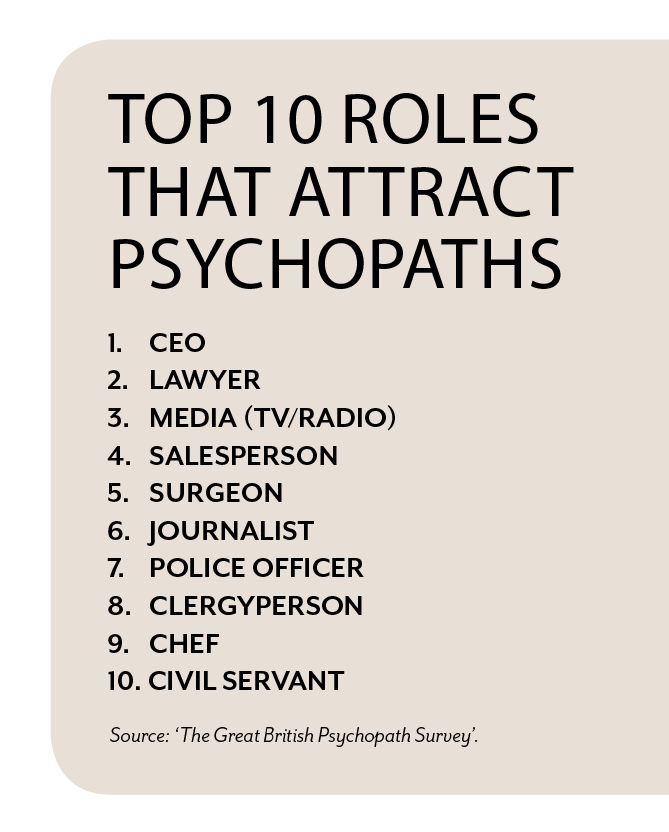How to deal with psychopaths in the workplace

Largely thanks to Hollywood, many think of a psychopath as a violent serial killer. And while some of them probably are, there is a much more dangerous version that you are more likely to encounter every day in the workplace.
Psychopaths are real people. They work with you, and for you. In any given Anglo-Saxon dominated workplace, there are probably more psychopaths than people with red hair.
They are not a figment of a psychologist’s imagination, and they are not (usually) axe murderers. They have not decided to be psychopathic; they just suffer from an irreversible failure of socialisation, which impairs their ability to cooperate with other humans. This means they always act in a self-serving fashion without regard for the consequences.

The critical difference between a psychopath and the rest of us is their complete inability to feel empathy. They care for nobody but themselves and are quite happy to use any means possible to remove anything that gets between them and their goal – accumulating more power and money for themselves.
As a general rule, a psychopath is drawn to careers that give them power over others – and, according to The Great British Psychopath Survey, the position that attracts the most psychopaths is CEO.
Psychopaths believe they are superior to everybody and that the role of all other people is to deliver rewards to them. Add this to their prodigious ability to charm, and their propensity to make up whatever achievements they need to get the job, and it’s easy to see how they may be fast-tracked. As a result, you can expect them to be towards the top of any corporate structure.
To the psychopath, the team that works for them needs to be tightly controlled and completely compliant. Psychopaths use classic manipulation tactics, singling out individual team members for public punishment, rotating those with favoured status, implementing ever more detailed micromanagement, and the ramping up of secrecy.
After a short period of exposure to these psychopathic tactics, the average workplace divides into two camps: ‘patrons and pawns’ who support the psychopath; and ‘police and patsies’ who detest them but are powerless to do anything because of the protection provided to the psychopath by the patrons.
An HR manager is more likely to know them as micromanagers, workplace bullies, or ‘kiss up, kick down’ managers. They work very hard at charming those who have power over them, but present a different face to the team that works for them. The workplace under a psychopath is in constant turmoil. Factions are rife, sick leave sky-rockets, staff turnover becomes endemic, and productivity drops like a stone.
Recent studies have concluded that people working for a psychopathic manager are approximately twice as likely to take sick leave as those working for a normal manager. One recent study calculated that this productivity drag amounted to 17.4% in Italian companies.
Another study commissioned by a major Australian health fund in 2007 revealed that the total cost to the economy of work-induced stress was $14.8 billion, while the direct cost of stress-related absenteeism and presenteeism – being at work but not working – was $10.11 billion a year.
If your organisation’s sick leave is blowing out and your productivity is dropping, then have a close look at the person who all the suddenly sick people work for.
The higher up the psychopath is on the corporate ladder, the more damaging staff attrition will be. At C-suite level, they will eventually cause more competent managers to leave, or they’ll target them for dismissal if they perceive them as competition. This inevitably results in entire tiers of experienced managers being obliterated.
With no competent leadership from above, each successive tier below becomes less productive, less focused on the aims of the organisation, and more focused on just keeping their job (while they look for the next one).
Luckily the cure is easy. Well, easy to say. It’s honesty and transparency. The best place
to hide a murder is in a massacre, and the best place to hide a lie is in a company full of liars.
It is much harder for a psychopath to use deceit to their advantage if everybody else is honest.
Companies that ban secret communication channels, reward honesty, punish dishonesty, encourage whistle-blowing, and who have strong, honest and independent HR divisions (and boards that listen to them) are much more likely to control psychopaths and massively limit the harm they can inflict. This will not stop you employing psychopaths but it will ensure they are working for the greater good of your company rather than destroying its culture and its future.
David Gillespie’s book Taming Toxic People: The science of identifying and dealing with psychopaths at work & at home is available now.